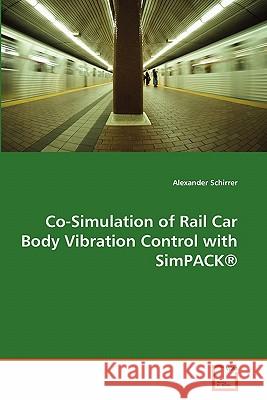Co-Simulation of Rail Car Body Vibration Control with Simpack (R) » książka
Co-Simulation of Rail Car Body Vibration Control with Simpack (R)
ISBN-13: 9783639306927 / Angielski / Miękka / 2010 / 132 str.
In this work, an advanced active vibration control system acting on a railway vehicle multibody dynamic model is applied to show the possible reduction of rail car body vibration amplitudes to improve ride comfort. The control concept uses Piezo stack actuators directly acting on the rail car body structure. Several promising actuator positioning cases are evaluated in various excitation scenarios by co-simulation of the multibody system dynamics in the SimPACK(r) simulation environment and the online vibration control algorithm in MatLab/SIMULINK(r). This way, a meaningful analysis of the system in its full complexity is carried out, showing the achievable improvement in ride comfort. Besides the simulation setup and results, this work contains a step by step instruction of the controller design procedure. There, critical decisions in the control design process are pointed out. A detailed modeling of the piezoelectric actuators is performed to address non-linearities and to show compensation measures. The concluding result interpretation and outlook discuss the capabilities of the approach and provides guidelines for the choice and placement of actuators for real railway vehicles
In this work, an advanced active vibration control system acting on a railway vehicle multibody dynamic model is applied to show the possible reduction of rail car body vibration amplitudes to improve ride comfort. The control concept uses Piezo stack actuators directly acting on the rail car body structure. Several promising actuator positioning cases are evaluated in various excitation scenarios by co-simulation of the multibody system dynamics in the SimPACK® simulation environment and the online vibration control algorithm in MatLab/SIMULINK®. This way, a meaningful analysis of the system in its full complexity is carried out, showing the achievable improvement in ride comfort. Besides the simulation setup and results, this work contains a step by step instruction of the controller design procedure. There, critical decisions in the control design process are pointed out. A detailed modeling of the piezoelectric actuators is performed to address non-linearities and to show compensation measures. The concluding result interpretation and outlook discuss the capabilities of the approach and provides guidelines for the choice and placement of actuators for real railway vehicles.











